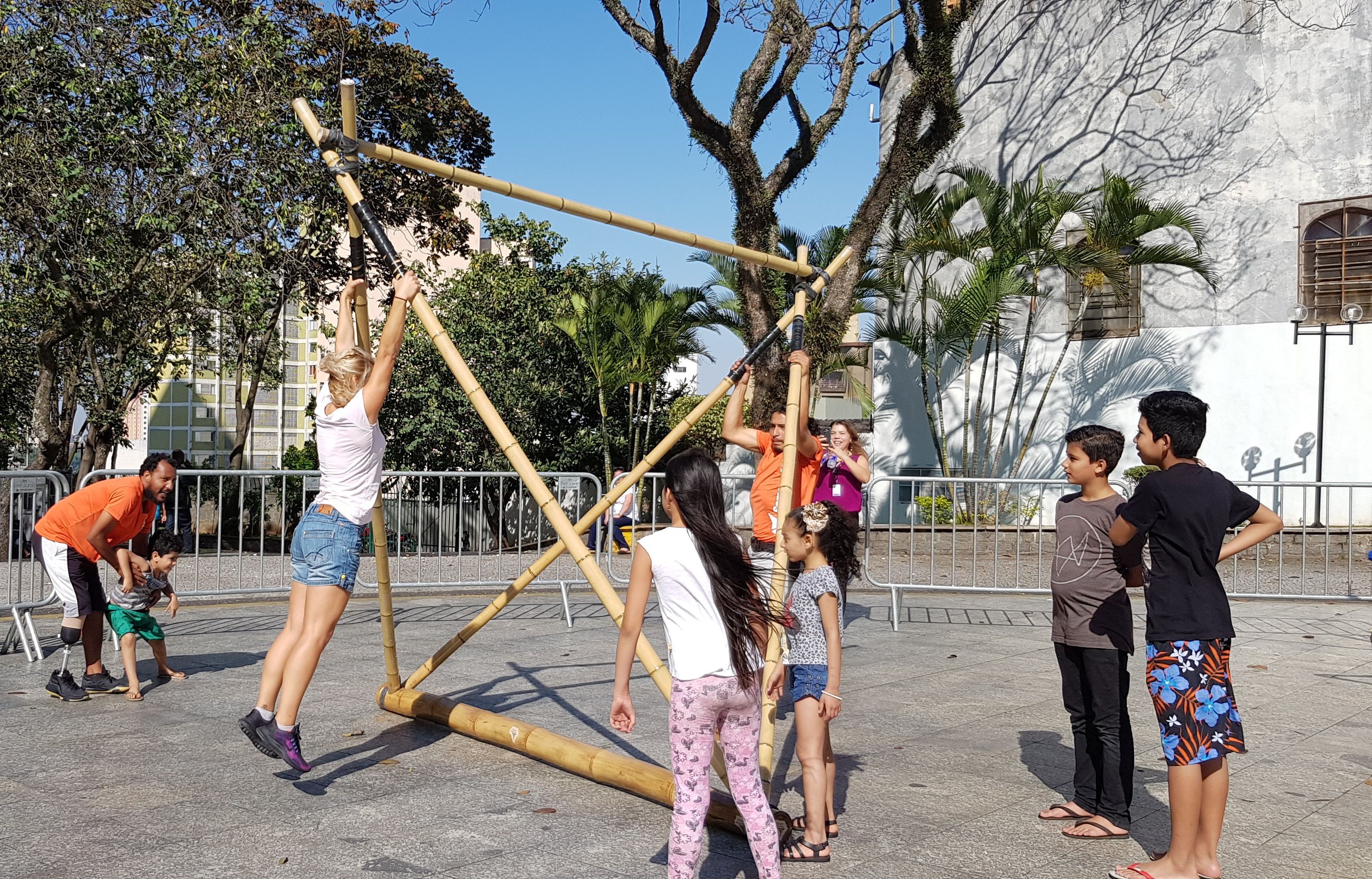With the MOVE Congress 2019 just around the corner, I couldn’t be more ready to moderate and present to you the ‘Redefining an active lifestyle with MOVEment Spaces’ track in Budapest on 17 October. The track has such a great diversity of speakers – including experts in architecture, urban planning, physical activity promotion, placemaking – representing both the civil society and public sectors who are just as ready to share their new ideas, concepts and tools.
During the day the MOVE Congress participants will hear stories from the Netherlands, Brazil, Greece and of course our host country – Hungary. The track will be a combination of keynote presentations, best practice examples, Q&A sessions and two hands-on activities: a place game with the Placemaking Europe crew, and a MOVEment Spaces tour of Budapest with Danil Radai representing Budapest Urban Ideals.
Why MOVEment Spaces are so important
WHO Europe’s publication, Towards more physical activity in cities, says it all: “Levels of physical activity are strongly determined by the physical environment, and smart improvements to the design and layout of our cities can have significant benefits.”
Yet, too many citizens living in today’s cities are constantly intimidated by high-rise buildings, cars, concrete, and fences that make using these spaces for exercise seem like an impossible dream or a death-defying experience.
At the same time, we – the people and organisations promoting physical activity – have realised that we need to spark some innovation into the delivery of physical activity programmes by using existing urban spaces and facilities more creatively.
That’s why International Sport and Culture Association (ISCA) created the MOVEment Spaces as both a project and a term to describe how we can imagine urban spaces as settings to be physically active and enhance them so they are more inviting for people to use.
In this track, we will aim to show the potential of joint actions between the grassroots sport sector and the urban development/placemaking field so we can work together to achieve our common goal: healthier, happier and more physically active citizens.
Some of the questions we will tackle during the track are:
- The main challenges for cities in the coming decade in making their citizens more physically active.
- Addressing the lack of a multi-stakeholder and multi-level governance approach by establishing strong partnerships at the local level.
- Health and physical activity are not yet explicitly covered by the urban agenda. How do we change that?
- To see the bigger picture that active living positively contributes to social cohesion, wellbeing, and economic prosperity in cities.
- Harnessing the impact of walking and cycling as attainable ways to decrease urban congestion.
- Bringing together the activities of urban units, local partners and large business companies, that are also involved in the implementation of projects.
What is placemaking and how can we use it to get more people active?
During the track, we will present the concept of Placemaking, which, according to Placemaking Europe, “is a strategy for co-creation that focuses on economic and social well-being, as well as, quality of life. Public space quality is the backbone of a sustainable city. To ensure quality in the public realm, cities need great streets supported by places that intuitively captivate users to want to stay longer, human-scale inspired by interaction between buildings and streets, ownership by users, placemaking, good plinths, and a person-centered approach based on user experience”.
Placemaking as a concept and a tool will be presented in theory and practice by four experts:
Hans Karssenberg – Founding Partner at STIPO and the City at Eye Level, Netherlands. His talk will be on The City at Eye Level and the many faces of placemaking: for peace, for social inclusion; for physical activity and much more. Hans loves great places where people meet. He is devoted to human scale, mingled, multi-layered cities, great public spaces, involved communities, and true sustainability. He loves working with people of all kinds, interests, and disciplines, creative and surprising processes, thinking and acting, short and long term.
Vivian Doumpa – Urban Planner and Geographer, Greece. Her talk will be on how, by mixing aspects and tools of placemaking, participatory planning, and socio-cultural management, we can develop interdisciplinary approaches, methodologies, partnerships, and projects that enhance inclusivity and equity in urban communities. Vivian is inspired by and appreciates the value of culture and creativity in daily life. She is enjoying life as a freelancer, collaborating on projects that focus on public spaces and placemaking, urban and spatial strategic development, transnational cooperation programmes, as well as research on issues related to street performers and urban music studies.
Levente Polyak – Director, Eutropian, Rome-Vienna-Budapest. He has worked on urban regeneration programs for the New York, Paris, Rome, Vienna, and Budapest municipalities. His talk will be on guidelines for designing and sustaining partnerships across sectors, funding schemes; and mobilisation and activation of communities all linked to inclusive, sustainable places for people. With his organisation Eutropean, he offers assistance to municipalities, NGOs and community groups in participatory planning, policy development as well as in fundraising, cooperation, and communication. Eutropean is specialised in urban regeneration processes, cultural development, community participation, local economic development, and social innovation, with a special focus on building development scenarios on existing resources.
Daniel Radai – Urban Planner (strategic placemaker) and water polo coach, Hungary. He is currently working on how to galvanise everyday active life in the urban environment – particularly by encouraging cycling, running and fitness in the city. He will present the Urban Ideals project aimed at contributing to an active, healthy city with alternative space-use acupuncture strategies. Daniel’s main goals are healthy and resilient communities and urban environments. Observing and inspired by policies, public spaces, mobility and community life globally, Daniel offers the combined assets of two greatly different professions – sports coach and urban planner – to successfully reflect on and tackle varying present and foreseen challenges.
More speakers will be announced soon. Are you ready to explore Budapest with us?
Book your seat at the MOVE Congress
By Laska Nenova, ISCA
“Why I can’t wait to bring you the MOVEment Spaces and placemaking track”
With the MOVE Congress 2019 just around the corner, I couldn’t be more ready to moderate and present to you the 'Redefining an active lifestyle with MOVEment Spaces' track in Budapest on 17 October. The track has such a great diversity of speakers – including experts in architecture, urban planning, physical activity promotion, placemaking – representing both the civil society and public sectors who are just as ready to share their new ideas, concepts and tools. During the day the MOVE
MOVING also means advocating for our cause
At the MOVE Congress 2017 closing session on Friday 6 October, ISCA Secretary General Jacob Schouenborg led an open panel discussion together with ISCA North America Chair Jayne Greenberg, Pauline Harper from EPODE International and Rose-Marie Repond from EUPEA on the WHO’s recent draft of a Global Action Plan for Physical Activity. So along with making physical moves to encourage others to get active, it is also important for the delegates to take political action and make strategic moves to get
Physical activity promoters from six continents made their MOVE at the MOVE Congress 2017
The MOVE Congress 2017 in Birmingham, UK, from 4-6 October gathered stakeholders in grassroots sport and physical activity from six continents and countries as far and wide as New Zealand, Costa Rica, the US and Brazil. From transforming the Birmingham Council House’s Banqueting Hall into a 5Rhythms “ISCA Disco” at the opening session, to presentations that got the participants thinking and sharing their views, to more dancing with a Bhangra and barn dance workshop at the networking dinner – the 8th
“What a responsibility we have!”
The MOVE Congress 2017 puts the spotlight on us as enablers of the human right to MOVE. The barriers that get in the way of the average citizen exercising their human right to move are plentiful, according to the presenters at this year’s MOVE Congress. Anything from money to gender-stereotyped activities, to lack of safety, to perception, to litter and lazy dog owners stops people from using their environment as a space to be active. “It’s easier to find the millions to
Video highlights from the opening of the MOVE Congress 2017
The MOVE Congress 2017 started with not one, but two dances! The Birmingham Council House was a grand backdrop to the unique blend of spontaneous 5Rhythms moves, opening speeches and an Indian bhangra dance finale. For a glimpse of the action, watch the video below. Missed the conference? Then stay tuned for the MOVE Congress 2019 - it may visit your city
MOVE Congress 2017 starts with a Call to MOVE
It’s our human right to move – so what’s stopping us? MOVE Congress 2017 facilitator Sean Blair from ProMeet greeted this year’s delegates when they arrived with a Call to MOVE. And before the opening speeches even began, Birmingham Council House’s banqueting hall had transformed into a dance floor led by Neil Pinnock from 5 Rhythms and six of his co-dancers. “I don’t think the city has seen an opening of a Congress like this”, Birmingham Councillor Ian Ward said
Birmingham, UK in focus – what to expect?
Frequent Flyer or just a Novice Traveller, we have prepared a list of things to check before coming to Birmingham this October. As UK is the land of many perks, then it might be good to check this before closing the zipper of your suitcase – are you ready and prepared? ✈︎ Adapt the power adapters ✈︎ UK is a country where traffic drives on the left Note this within a roundabout where the circulation is clockwise! ✈︎ Change your currency to pounds Even though
Equity vs Equality – remove the barriers to reach the “hard-to-reach”
In general, we have a good understanding of who the hard-to-reach groups are and why it is important to get them engaged in the community. Although everyone has the fundamental right to move, many social groups are being left behind when it comes to access and awareness of affordable activities that can enhance their wellbeing. As a result, their physical activity levels tend to be much lower and it can be difficult to motivate them to be more active. What to do
If not now, then when? Don’t miss the MOVE Congress registration deadline!
Many sport-for-all promoters have already marked in their calendars three important dates – 4-6 October when MOVE Congress 2017 takes place. If you still haven’t reserved your ticket then the right moment is now – registration closes on Sunday 24 September. The full pass (250 euros) will guarantee you a ticket to one of the most dynamic conferences in the field. We will not just do the talking but stay active throughout the three days. The participants have a chance to
Check your fitness level during the MOVE Congress 2017
As one of the most active conferences in the world, the MOVE Congress always practices what it preaches. This year, the coffee breaks won’t be an exception. They will be an extra opportunity to get active, with the European Fitness Badge Active Corner. Participants who visit the European Fitness Badge Active Corner will get a taste of some of the European Fitness Badge test's activities and learn first-hand about this new, interactive tool. Developed by 7 European countries, the European Fitness Badge


